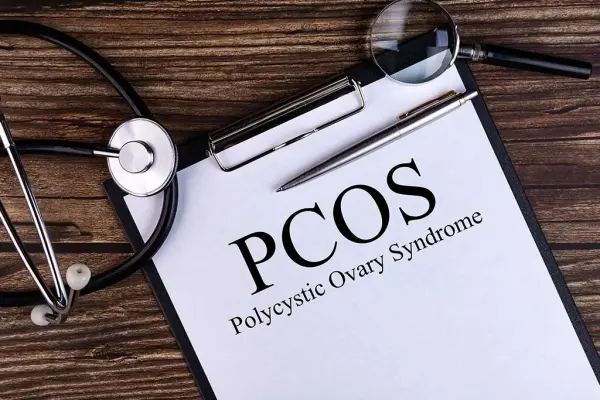Understanding the Underlying Causes of PCOS: A Complex Interplay
Understanding PCOS requires unravelling an intricate interplay of factors. Hormonal imbalances, genetic predisposition, insulin resistance, and lifestyle choices converge to create this complex condition. Elevated androgen levels disrupt ovulation, leading to cyst formation. Adipose tissue exacerbates hormone production, while insulin resistance amplifies androgen release. Genetic susceptibility underlies PCOS, influencing its manifestation. Lifestyle factors like diet, stress, and physical activity further impact its development. A detailed study of PCOS necessitates dissecting these multifaceted elements, paving the way for personalised approaches to diagnosis, treatment, and management. Moreover, PCOS carries a hereditary aspect, where women with a genetic background face an elevated level of susceptibility. Although the precise genetic pathways underpinning PCOS remain intricate and multifaceted, researchers have identified certain genes that could contribute to its development.
Unveiling the Symptoms of PCOS: A Multifaceted Presentation
PCOS presents with a diverse array of symptoms, which can manifest differently in each individual. The most typical signs are:
- Irregular Menstrual Patterns: Ovulation might be uneven or irregular, or it may not occur at all, which can cause irregular menstrual periods or even a total absence of a monthly cycle.
- Elevated Androgen Levels: Elevated androgen levels can cause actual side effects, including acne, excessive face and body hair growth (hirsutism), and male-pattern baldness.
- Formation of Ovarian Cysts: Ovarian cysts are little sacs loaded with a liquid that grows on the ovaries when eggs do not develop or release properly.
- Weight Variations: Those dealing with PCOS often encounter challenges in managing their weight, heightening the likelihood of obesity.
- Insulin resistance and metabolic abnormalities:PCOS is frequently associated with insulin resistance, making it more difficult to maintain stable blood sugar levels and increasing the risk of Type 2 diabetes.
- Influence on Emotional Health and Psychological Condition: PCOS can hurt mental health, inducing anxiety and feelings of despair and causing mood swings.
It is crucial to remember that not everyone with PCOS will necessarily have all the symptoms, and symptom intensity can vary greatly.
Navigating Treatment Options for PCOS: A Holistic Approach
PCOS is managed in a diverse and personalised way, frequently combining medication, targeted therapies, and lifestyle changes. The PCOS treatment objectives include symptom relief, fertility improvement, and lowering the danger of long-term health issues.
- Lifestyle Modifications: Following a healthy lifestyle can be exceptionally useful in managing PCOS. Through a well-balanced diet and steady physical activity, it is possible to improve insulin sensitivity, lower testosterone levels, and establish regular menstrual cycles.
- Medications: Depending on specific side effects and treatment goals, healthcare professionals may prescribe medications like hormonal contraceptives (birth control pills) to control menstrual cycles, androgen medications to treat hirsutism and acne, and meds expected to further improve insulin sensitivity.
- Fertility Interventions: Fertility Intervention, for example, Prescription-assisted Ovulation Induction or In Vitro Fertilisation ( IVF ), might be prompted for those attempting to get pregnant. Support for mental health is essential in addressing PCOS’s emotional and psychological impacts. Counselling, therapy, and support groups can provide invaluable assistance in managing the emotional challenges that often accompany the condition.
- Surgical Interventions: In some cases, fertility can be increased and ovulation induced by undergoing surgical operations like ovarian surgeris though this option is not advisable.
- Insulin-Sensitizing Medications: Metformin, a drug frequently prescribed to treat Type 2 diabetes, can help some women with PCOS by enhancing their insulin sensitivity and regulating their menstrual cycles.
The Importance of Individualised Care and Ongoing Research
Due to the complexity and heterogeneity of PCOS, each person’s experience and treatment requirements may be very different. A specialised and patient-centred approach to care is therefore essential. Effective management of PCOS requires regular monitoring, honest communication with medical professionals, and a readiness to modify treatment plans as necessary.
More treatment options may surface in the future as advancements in medicine occur, and fresh insights into the underlying conditions become available. People with PCOS may have access to more specialised and efficient interventions that cater to their particular needs as medicine advances.
Conclusion
In conclusion, PCOS is a complex hormonal condition with a range of symptoms and causes. While research into the condition’s specific causes is still ongoing, advances in medical knowledge are enhancing our capacity to properly manage and treat PCOS. By adopting a holistic approach that encompasses lifestyle changes, medications, and emotional support, individuals with PCOS can lead fulfilling lives and better navigate the challenges posed by this condition.

